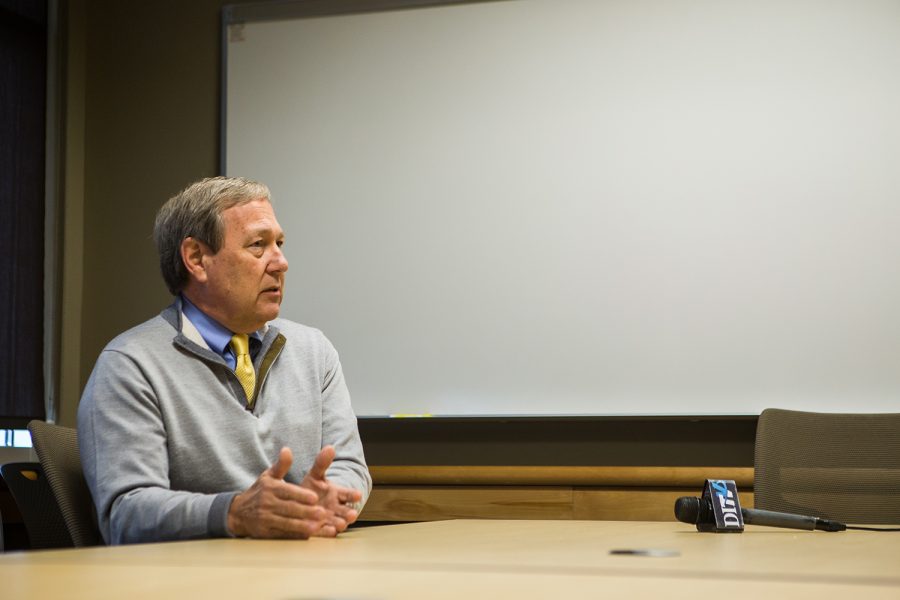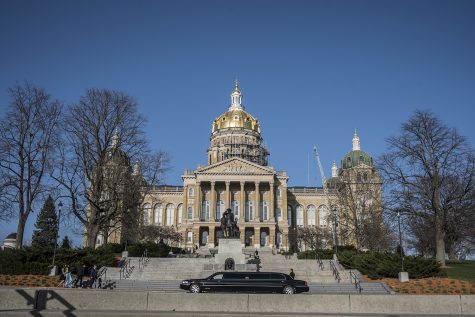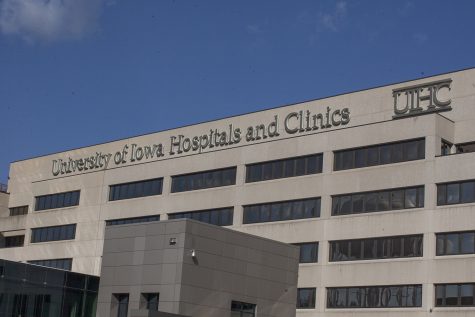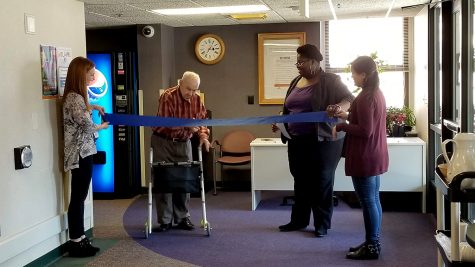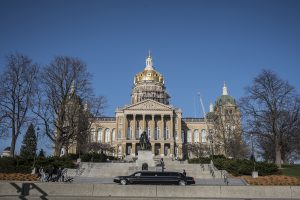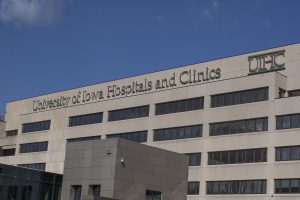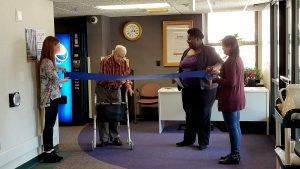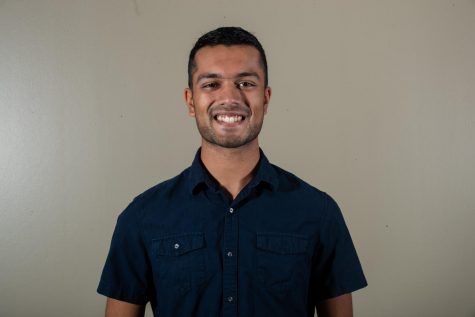Q&A: UI President Bruce Harreld talks free speech, campus changes, #DoesUIowaLoveMe
The Daily Iowan sat down with UI President Bruce Harreld on March 7 to discuss the new provost, the #DoesUIowaLoveMe movement, and the possible public/private utility partnership.
UI President Bruce Harreld speaks with The Daily Iowan in the Adler Journalism Building on Thursday, March 7, 2019.
March 12, 2019
The Daily Iowan: It’s been two years since the departure of former Provost Barry Butler, but the UI has hired a new provost. What do you want campus to know about Montserrat Fuentes?
Bruce Harreld: I want the campus to meet her in person — she’s wonderful. We had a really good list of candidates who came and met the community, and she was probably the best listener, the most accessible in a lot of ways. It’s interesting, because she has really solid research, very well respected in her field. So, she’s been down that path, but also she’s been at a public institution trying to make a difference in terms of graduation rates, retention rates, support for first-generation students, and all those things, so I think she’s going to bring a really interesting mix. She’s just a delightful human being, she’ll fit in really, really, really well.
I’d have to go back and look, but [the provost search] started something like 10 months ago, knowing it would take the better part of a year. But we purposefully put an interim in place … I was new, we were working on a number of issues, the most important being how we actually allocate resources across campus, and we talked about the collegiate economic analysis. That took an enormous amount of energy — of deans, department heads, across the entire campus.
RELATED: University of Iowa selects Montse Fuentes as new provost
So, we had this huge discussion of how we would go from a relatively closed resource allocation model, where everything, I would say jokingly, all the money poured into Jessup Hall, and then we sat in a closed conference room to try to figure out where to put it all, to a process that was completely open and transparent. For each college, we could see their own economics, and they’re quite different across the 11 colleges. So we’re going through that, and we decided as a team when Barry Butler left to become president at Embry-Riddle, that rather than go through a search process for probably 10 months at that point in time and then let whoever that is join the community, that maybe we needed to finish this piece of work and get it stabilized, and then bring a new provost in place.
So we picked among our midst [interim Provost] Sue Curry, who has been at a station in life where she wasn’t looking to be a long-term provost, and she could fill the role. She knew all the players, they had enormous respect for her, and we could move through these important sets of issues and get the stability on those, then introduce someone into the community. So we did that on purpose, and I feel really comfortable with it. The search committee did a great job reaching out to the entire community in the United States to bring candidates here. [Fuentes] will be here in late June and get her family here, get settled here. My best advice to her is to settle down and listen, and get actively engaged in the whole community for the next four or five months to absorb it.
DI: During the UI’s two years without a permanent provost, the 2020 initiative was around. Since the report had just been released last time we sat down, what was your reaction to that? There weren’t any sweeping proposals and no colleges were broken up as some thought would result from that.
Harreld: I didn’t initiate it. I met with the committee a couple of times, as I mentioned. I think at the end of the day, and I teach my students, some may remember, that when you get into structural issues, I actually always say you’re misorganized, and if you continue to restructure and restructure and restructure to find the perfect organization, it just takes an enormous amount of organizational energy, because people try to figure out new working relationships, and there’s confusion.
I think appropriately, more importantly, how you work and how you work across the organization, regardless of how you structure it. So I fully respect [the 2020 initiative]; I don’t have a problem with it. It’s actually an awful lot easier, because we know how we’re currently structured, there’s no new reporting relationships. I think the more important questions, and I think a lot of the discussion really did focus on CLAS and its size … I think there are national jewels in the College of Liberal Arts & Sciences, the performing arts at this campus is really critical to our culture, our past, and our future.
Question: Do we have an appropriate spotlight enough? Are they getting sufficient resources in [liberal arts] and [liberal-arts] decisions? Are they getting all the support they need to perform on a national and international basis? Same for the humanities, same for the sciences. I think in the sciences we need to be a little bit more thoughtful about some of the sciences that we’re teaching in the medical college. Or in some of the medical colleges, some of the same subjects rub up against the subjects being taught in the sciences in the College of Liberal Arts & Sciences. I think we could do a better job of harmonizing some of those, if you will, and making sure they’re appropriately — where there’s a difference, there’s an appropriate difference and not just a struggle between two different competing programs called biology. I think they look different. I’m completely comfortable with the report, we’ve moved on, that’s fine.
• • •
DI: In December, you’d said you’d be happy to go back to the regents and ask to reinstate the Labor Center, if the UI could find the right sort of funding arrangement. Just last week, you did that.
Harreld: There were several centers, I actually thought. We didn’t do any centers because of the title or what they were doing. We did them because I thought it was totally inappropriate, in a world where two-thirds of the funding is coming out of students and their families, to actually be funding a number of these centers that weren’t student-centered in their missions and activities, out of the general education fund. It was really a funding mechanism, so if they could find another way fund, we’d be more than willing to go back to the regents, and we did, and the regents reinstated.
RELATED: UI Labor Center to remain open after regents’ vote
I think now the question becomes, and again I have some degree of frustration because it took us a long time to get to the real work that needed to be done, which is the source of funding, and I would say we lost. I don’t know, I’d have to go back and look at the calendar, but we probably lost several months that could have been focused on the budget where the sources are funding, maybe writing research grants. I actually said this several times, I’d be glad to go with you on trips to talk to people who are interested in the research around unions and labor education and all the rest. Let’s go into that world and let’s help them support us. It took us several months to get focused on that.
So now my concern is there now going to be a moment? They have a plan, it’s great. In five years, they’ve got specific responsibilities. They’ve laid out that if they don’t meet their fiscal targets, what their actions will be, and I’m completely comfortable with all that. Next question is, like people say to me, you can say one thing but are you doing it, are they going to execute it? We’ll see. Often we get into these moments of euphoria and forget the next steps may be even harder than the first step, we’ve got to do what we said we would do.
You should know, there are one or two other [centers] for sure, that are considering the same type of actions. If they get to that place, we may also go back for others to support. But now they’re not being supported but through the general-education fund and not recycling student tuition money.
• • •
DI: Students took to social media last week to share their stories of being discriminated against or mistreated on campus with the #DoesUIowaLoveMe. What has your response been to hearing their stories and how will the university take action?
Harreld: It was an unusual week last week; I think we all learned a lot. I’m glad that it came out. Last week, we had a group of almost 50 faculty, staff, students going back through everything that was on social media and saying piece by piece by piece, “What do we need to do about this?” They then met again to review what’s happened after a few days, and we’ve now parsed the work out. I think [UI Vice President for Student Life] Melissa [Shivers] put a note out in the last 24 hours or at least it’s going out, to the community saying here’s what we’ve done, here’s what you can expect. It was a usual week in that it was a call to action, and I would say we’ve answered the call.
[Editor’s note: Shivers sent an email last week to student organizers of #DoesUIowaLoveMe about how the UI is proceeding with next steps in responding to the concerns brought to light from the movement.]
The frustration for me is that when I read all the social comments, I knew a lot of the people on Facebook who were making the comments. Six weeks ago, [University Counseling Service] Barry Schreier and a group of students are in my conference room, there probably 15 to 20 of us in the room, working on student counseling and what the issues are, what the problems are, what we can do about it. There were legitimate concerns in that meeting, but the intensity wasn’t nearly the intensity that I saw on social media. So I’m sitting here saying what is it about us that we can’t talk face-to-face when we’re in a meeting, why can’t we raise that? I just picked on counseling, there were other issues. There were comments made on social media by people I know, some students of mine said they were unfunding the cultural houses. That isn’t true. I’m glad we got to the issues, I’m glad we’re dealing with them. I really applaud and thank all the students that participated in it.
But I’m also sitting back on another level thinking what just happened here? Because I think we should hold ourselves to higher standards. I think we should have a process where we can talk about issues, and problems, and our concerns legitimately, then take action legitimately and not have to wait for the steam to get to such a level that it blows up. So I don’t know what to do with this. Is this our society today? If so, I think I’m pretty frustrated with it, but that’s OK, these are opportunities. We’re not perfect, we never said we were perfect. We’ll never be perfect, but the way we improve is by raising these issues. By not inflating these issues by saying we’re going to close things when we’re not going to close things, so we all need to hold ourselves to a higher standards, and I think we need to remind ourselves that humans need to communicate face-to-face at times.
RELATED: #DoesUIowaLoveMe? UI students ask question in social media movement
DI: Since that hashtag came about, have you had interaction with the group that organized #DoesUIowaLoveMe?
Harreld: I personally haven’t, but Melissa has been in a number of those, she has followed up with them, she’s asked them to come together, she met with them. I think she would say that they were very constructive sessions in both ways. I mean I think that things were said, I think that things have been responded to, I think that more of that’s necessary. But why do we have to get there? We can meet all sorts of different ways; maybe there needs to be a more normal way to meet.
I also think there’s another issue, but one of the frustrating things is for some of us, students come and go, that’s why we’re here, so let’s understand. Hopefully, they enter, and they grow, and then graduate and get on with their lives. I fully understand that. On the other hand, as they come in, they don’t quite know how we do things. There’s a process of education of how we do things. In some cases of a public institution, we have to remind ourselves of the First Amendment and the right to do certain things, even if we don’t like them, it’s still the American way. So we go through those types of educations, and then people for good leave us and graduate, and then we have to do it all over again.
I think part of the issue that I’ve found myself in, I’m not so sure we’re doing a good enough job one year, to the next year, to the next year, with a new groups of leaders, bringing them up to speed as to what we’re doing. I think also where we’re doing a good enough job of that, we’re probably not also doing a good enough job listening to what these new leaders are saying: “Well yeah, I know we do it that way, but we’d like to change that.” We kind of get into a “No, that’s how we do things,” and we need to listen that and take it all in more constructively as a challenge that we can improve. There’s a lot in this, there’s a lot of food for thought, and there’s like a theme semester in what happened last week, and I think it would be really, really, really useful dialogue for us. But then the next issue is we have to do it again next year, it’s who we are.
DI: How do you balance the First Amendment conflict as an administrator with students expressing in this movement issues with certain speech that they view as hateful?
Harreld: The courts give us some, and I’m not an attorney, but the courts give us some pretty interesting definitions of this. Yes, on a daily basis people say things to me that I find offensive, personally, but they don’t necessarily seem threatening to me. The court has a pretty high standard, and I understand when someone stands on the Pentacrest and protests about a particular issue that you or I don’t share, then it’s like whoa, there’s an attack of our personal values. The American way is to learn and listen, or not engage and move on. It isn’t a threat, it’s not an active threat, it’s not hate speech, violence inciting — those are pretty high standards.
I think we sometimes want to reinterpret hate and violent speech in things we just don’t like, and that usually isn’t the case. I think it’s important to understand that the students who want to talk about a particular issue that others don’t want to listen to and find offensive and not to their values are allowing that to take place on campus. It’s also protecting the values of those on the other side of that issue when they want to speak out and need support. So you shouldn’t equate the university allowing these various groups to say what they’d like to say, hopefully in a constructive way, as our supporting one or the other. That’s your issue as a citizen to decide where you want to be on these.
There’s a wonderful park in London, my daughter’s going to King’s College, and every once in a while on Sunday we’ll go to this place. I’m trying to remember this park, it’s one of the parks they have a forum and a box and people can stand on the box and express whatever they’d like to express for so many minutes. It’s a speakers corner, I think they call it; it’s a similar expression of this, that’s democracy, that’s our system. We fight a lot to protect that. I understand that it’s frustrating, but I also remind myself, and remind all our students, don’t go, don’t engage, why are you there? Maybe you want to listen to it and learn from it because there’s something that you find fascinating or maybe something that’s opening your eyes, that’s fine, that’s the process. On the other hand, if you say I really don’t support this idea at all, make the crowd smaller.
• • •
DI: Amid all of that happening last week, the Understanding Your Whiteness workshop was rescheduled. Some people were worried about what its cancellation meant for our ability on campus to have open discussions about race and difficult subjects. What are your thoughts on those concerns?
Harreld: I agree. I’ve been part of that kind of training since the 1980s. Every organization I’ve been in has gone through some kind of training about difficult questions in the work environment, and behaviors, and comments, sensitivity. Often, I often speak my mind and get in trouble, because I realize what I say and how I’m saying it can be interpreted by someone else and in totally a different way than what I intended it. I’ve learned that that’s my problem, not you as a listener. I need to be sensitive to your views. That’s what these types of programs help us on that, help us become comfortable with that. I think that’s very important, and then I think we titled it provocatively. I think it had everyone thinking, ‘What is this?’ It’s a whiteness, it’s a privilege, we’re going to voice that into everyone’s face, but it’s actually diversity training. We’ve been doing it for 20 to 30 years through this organization.
I think it’s important work to do. I don’t think it’s any different from what goes on in state legislatures, business organizations, military, most athletics teams go through things like that as a part of the team-building process. We decided for whatever reason we were going to cancel it, and now we rescheduled it. I don’t know why we canceled it. It could have been good reasons for it. It was because we were worried about the heat we were taking; that’s unfortunate, because we should not. This is right, this is important. I’m glad we’re rescheduling it. We’re going to do the same thing on sexual assault. Some people don’t like how we’re trying to support victims in our environment — are those people going to get us to stop these training sessions? Of course not. It’s the right thing to do.
• • •
DI: President Trump recently hinted that he would sign an executive order barring colleges from receiving federal aid if they don’t protect all students’ First Amendment rights. What is your response to that?
Harreld: It’s kind of ironic on day a where we support the right to talk about a wall, two days or three days later, this is going through the system. Look, I’ve learned not to comment on intentions. I’d like to see the details when and if it gets signed, but I think it would be very unfortunate. But, hey, even profess and understand the legality of that probably runs up against other issues. When it’s actually active, we’ll take a look at it and see what happens. My guess is that, it depends on how it’s drafted, but it could spend a bit of time in court. We’ve seen the same thing on other executive orders here, particularly around DACA and other types of things, border control. Let’s not have a serious conversation on the possibilities and could’ves or maybe it’ll happen. Let’s focus our energy on what it is right now.
RELATED: Trump promises executive order addressing university free speech
• • •
DI: The UI announced last month that it’s exploring a public/private partnership for its utility system. Can you walk us through what went through considering this idea and your overall feelings on the possibility?
Harreld: Well, this could take hours. Let me see if I can do this as quickly as possible. First of all, I think we should understand the why. I think we understand, and are probably sick of the phrase generational disinvestment, but we’ve had a pretty significant shift across the nation in state-by-state, de-appropriating support for higher education. The adjustment has been, in many states, increasingly higher tuition. We’re one of the states where we have not had tuition increases of high enough to recover the decreasing state’s [funding]. So, that’s why we have a strategic plan that we approved three years ago. The strategic plan says we need to do this in student success, but out of the frustrations last week of things we need to get done to support students better are in that side of the strategic plan, that one pillar.
Then we still have work to do, big work to do, in terms of research on this campus, which is why a lot of our faculty are here — and by the way, it connects to student success, because we try to engage a lot of students, even undergraduates, in the research mission of the university.
Then we have economic development. Those are the three pillars for our strategic plan. When we look out at state support tuition, thankfully the Board [of Regents] now has a long-term tuition model in place, and so there’s some stability of planning that for the next several years. Internal costs take out that you’ve heard me talk about for the past several years, we still have a gap, and we’re not going to be able to execute against our strategic plan without. I don’t know, Terry Johnson our CFO yesterday in a meeting said something like $14 million to $20 million gap every year. You heard me talk about North Carolina, a smaller school, more per capita GDP in North Carolina is lower than it is in Iowa, etc., etc., yet they get $260 million, roughly, more a year, per year, than we do, with 5,000 fewer students. We’re in that league, we’re trying to compete with them, so if we’re actually going to be able to execute our strategic plan and continue to improve, and just maintain our rankings, we need more resources.
We started a couple years ago looking for alternative mechanisms, part of it will be increasing our philanthropy, part of a continued cost take out, at the end of the day we need more. We have been studying what other universities around the United States and the world have been doing around these public/private partnerships. At the end of the day, it has an awful lot to do with an entity like ourselves that does not pay taxes, and as a result of that, if we let a third party come in and operate part of our facilities, a residence hall or utilities, some institutions have done it around parking, even sports complexes, and that entity is a private entity that does pay taxes, and it may well be that the construction of the transaction is structured in a way that it might help them shelter some of their taxes. That’s what this is, and in that process, it could free up hundreds of millions of dollars that could pour into the university. Which we would then put into an endowment and the returns on that endowment every year would fill that $14 million to $20 million gap. That’s the objective. To get there, we’ve got a lot of work to do.
We cannot do this sort of transaction by not recognizing that we have well over 100 employees in this area, and around utilities, that have done a fantastic job, and we need to make sure that they’re taken care of. We’re not doing this to save money and actually reduce the workforce, so we need to make sure they have viable careers, either with the new entity or the university.
Similarly, we make commitments to sustainability and being coal-free by 2025. If the new company isn’t willing to endorse that, then we’ve got some issues.
Longer term, we have to maintain the facilities in a way that are first class. We have to protect redundancy. We can’t be without power, we can’t be without high-quality water for our research purposes, etc. I can keep going; there are a whole host of really important variables that need to be dealt with, put into a contract, lived up to and between here and there, we’ll see. I won’t recommend this to the Board of Regents unless we can make sure we’re not putting any of our employees any of our values and any of our systems at risk in this type of transaction. If we end up mortgaging our values and our future, it’s a mistake and wrong move on our part. So we’re working on the process and we’re trying to work very transparently.
We had two public meetings this week on different sides of campus. We met with faculty, we met with the students. I think we’ll go into a little pause here for a month or so, so we can take the feedback we’ve already gotten, put it into some documents that we can send into the market place and let prospective bidders digest, and we’ll measure their interest, and then we’ll come back sometime in a few months and say here’s what we’ve learned, here’s what the ideal structure will be to answer some of the questions we’re hearing in the feedback. Somewhere next fall, maybe we’ll proceed.
We’ve had 20 or maybe more organizations already asking initial expressions of interest. I think ultimately there will be 100 or more firms that will be interested in this, and then we’ll pare it down. There’s a lot to do, a lot to do. Not at all certain, I said yesterday in a meeting, a town meeting, we need to assume this will not happen. Because if we back up on some of the others things we’ve been doing around tuition, working with the state to keep stability in the state appropriations, taking our costs up, if we back up on that and lose a year of momentum on those types of things we’ve been working on for the past several years, and then don’t get a deal done, we’ve lost a year. I think our, in some sense, our plan of record is what we’ve been doing and we need to view the [public/private] as a backup alternative, and maybe we’ll get some progress.
RELATED: UI exploring public-private partnership for utility system
DI: With a partnership like that, it kind of is like an investment, of course, so what’s the university’s investment in that partnership, what do we have to put into it initially?
Harreld: We already have, we’ve giving them the right to operate a pretty well-honed machine in the utility. We’ve giving them a payment over the next 35 to 50 years, however long the contract is. We’re giving them a very high credit for the organization that will make annual payments to them. That’s what they get out of it, as well as a contract that is depreciable from the IRS perspective, and that gives them that tax shelter.
Then, we’re going to have to give them a governance structure. They’ll have to work collaboratively to get together. We will still own the plant. We’re not leasing the plant, we’re not selling the plant, so we’ll still own it, we need to make sure they maintain it in a first-class way. Sometime in the future, it will revert back to our ownership. A lot of moving parts to it, a lot of opportunities to get things wrong, so we need to use world-class advisers to help us, people who have been through this before, who’ve seen failures in some of these. We need to actually not rush, we need to go piece by piece by piece.
We’ve got a group of people in our utilities that know an awful lot, what’s in the tunnels, where the meters, how do you tune the meters, the list goes on and on and on in terms of their knowledge. We’re now trying to get them to the point where they’re involved in various working teams because somehow much of that needs to get worked into the contract with another party. At the end of the day, it could be really, really useful additional source of revenue for the institution. It could really be a difference-maker. I don’t think we can take more costs out. I don’t think we’re going to be able to get our tuition up any more than that long-term plan from the regents is, and I applaud them for doing that. I pray that the state, right now it doesn’t look like there’s going to be a de-appropriation this year, what about next year? What about the year after that? We need more philanthropy and more alternatives like this to continue to maintain the excellence, to stay world-class competitive against the North Carolinas, Michigans, UCLAs, Texas. It’s critical.
• • •
DI: Do you think students on campus, or how many percentage wise, how many students on campus do you think could either name the president of the University of Iowa or recognize you?
Harreld: There’s a piece of me that wants to say honestly probably not very many, I don’t know what that is. Then there’s a piece of me that wants to say not enough. I don’t know, I’ve never thought about it.
It’s kind of funny because I try not to be very aloof, I try to walk around a lot on campus. I see people making eye contact and saying hi, so I’d love to say it’s 84 percent, but my guess is it’s more something like 21 percent or maybe even lower, I don’t know. It’ll be a humbling number I’m sure.



